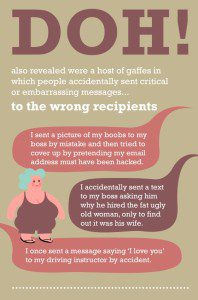Blundering Brits are leaving family, friends and workmates raging or red-faced – with their email and text gaffes, according to new research.
Almost 70 per cent said they regularly send messages to the wrong person.
Of those who accidentally sent a bitchy email or text message to the target of their whinge, a third ended up having a blazing row with them – and one in 10 has not spoken to them since.
One in 10 admitted they had been sacked for inadvertently sending a rude picture or risqué joke to their boss.
And one in three have sent a message that lost a lot in translation after being mangled by their Smartphone’s ‘autocorrect’ feature.
Mixed messages included:
- The woman who received a message on a dating website asking if she had been on the site for long and replied – or so she thought – “I’ve been on this for ages, no luck yet though”. It was autocorrected to “I’ve been on this for sausage, no luck yet though “.
- The texter who tried to tell a friend that “chocolate makes you fat”, which came out as “chocolate makes you gay”
- The woman who texted a male workmate who got a part in a musical: “can’t wait to see you in the show”, which was mangled to “can’t wait to see you in the shower”.
- The worker who texted a colleague about the Lottery, meaning to say “I want six all the time” …
The poll of 2,000 UK adults was conducted by paid survey site OnePoll.com.
It also revealed a host of embarrassing slips in which people accidentally sent critical or embarrassing messages to the wrong recipients. They included:
- I accidentally sent a text to my boss asking him why he hired the fat ugly old woman, only to find out it was his wife
- I was arranging a funeral and accidentally forwarded a penis enlargement email to the undertaker
- I called my niece a nasty cow – to her mother instead of my daughter.
- I am a male and I sent a sexy, flirty message to a female colleague suggesting we share a hotel room after the office Xmas party. However, I sent it to a male colleague by mistake. Instead of being upset he replied that he was surprised by my suggestion but totally up for it.
- I intended to send an email about a young lady work colleague bitching about her, to my colleague. I unintentionally sent it to her by mistake. I was disciplined for this because she reported me.
- I once sent a message saying ‘I love you’ to my driving instructor by accident.
- I accidentally sent a message to my boss, who has a habit of asking for stuff at5pm on a Friday. I meant to send it to a colleague, saying ‘What the hell does she want me to do next, cook her dinner, clean her house, take her kids to football, write her reports, work all weekend for nothing, move in with her boring husband?’ Luckily she has a sense of humour and although it was a bit cold for a couple of hours we had a laugh and she agreed that her husband was boring.
- I sent a picture of my boobs to my boss by mistake and then tried to cover up by pretending my email address must have been hacked.
The survey revealed that people are most likely to send emails to the wrong people via text message, followed by desktop email, smartphone email, tablet email and WhatsApp.
Over 40 per cent said they had been on the receiving end of a message clearly intended for someone else.
One in 10 confessed to penning a raunchy or romantic text to their partner and then sending it to the wrong person.
Workmates were most likely to get these, followed by the sender’s mother, boss, sister and father.
Almost 40 per cent of respondents admitted having accidentally hit the ‘reply to all’ button on an email.
A spokesman for OnePoll said :
“The results of our survey show that it always pays to double-check the message – and the recipient – before pressing ‘send’.
“A split-second’s carelessness can cause huge embarrassment and can lead to bust-ups with friends, family or work colleagues.
“We live in a fast-moving age but it pays to take a moment to review the message before pressing the button.”
The opinions expressed in this post belongs to the individual contributors and do not necessarily reflect the views of Information Security Buzz.







